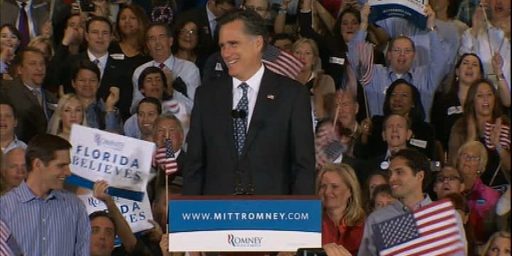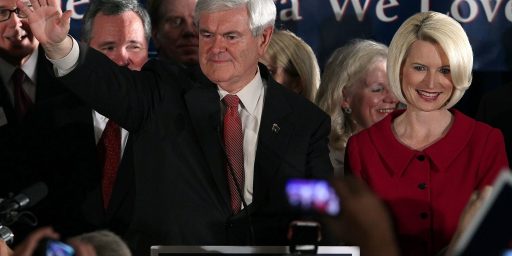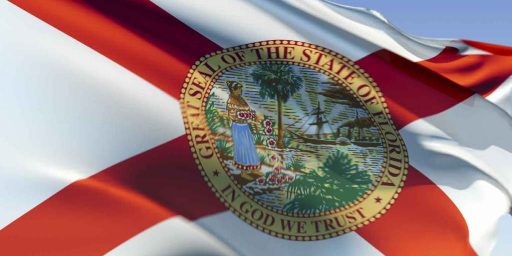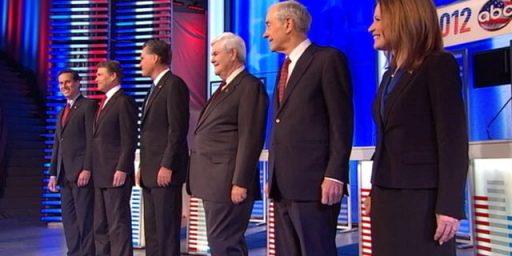The Nationalization of American Politics
Local issues barely matter in Congressional races anymore.

NPR’s Danielle Kurtzleben reports “Voters everywhere are talking about the same issues. Here’s why that matters.” After the obligatory anecdote, she gets to it:
“A nationalized politics is one in which the same kinds of issues are resonant nationwide,” says Daniel Hopkins, a political science professor at the University of Pennsylvania, and the author of The Increasingly United States, a book about the nationalization of U.S. politics — the way that national-level political narratives end up trumping local- and state-level concerns. For example, topics that have often played large roles in local and regional politics in Iowa – agriculture, trade, and education — rarely came up in conversations with voters, or in campaign speeches.
Both parties see this district as potentially pivotal in winning the House, and the race will be hard-fought — the Cook Political Report currently lists it as “Lean Republican.” Close races at a time when Congress is closely divided can further prompt voters to think nationally, Hopkins says.
“You know, if you think back, at least one branch of Congress has been up for grabs or has actually changed hands in basically every election since 2000,” he said.
One sign of nationalization is when candidates symbolically invoke politicians from elsewhere.
This is followed by examples of candidates doing just that to set up this:
In a nationalized political ecosystem, each party has its own system of symbols and language. Even knowledgeable voters in Iowa may not know a lot of specifics about Warren or Jordan’s politics, but they only need to know enough to know that Warren is unapologetically progressive, or that Jordan is pugilistic and conservative.
This is followed by a plot twist:
Often the nationalization of politics is cast as bad for voters and democracy as a whole, for a number of reasons. One is that it flattens geographical representation, meaning regional issues like agriculture and economic development get less attention.
Another is that it reduces the importance of candidate quality and qualifications, making party the most important factor; one basic measure of nationalization is the decline of split-ticket voting.
That means elections become referenda on party leadership — for example, Donald Trump or Joe Biden or Nancy Pelosi. In fact, the relentless, vitriolic focus within the Republican Party on Pelosi as a villain is now receiving renewed scrutiny in light of the recent violent attack on her husband.
As it should. But, while the level of vitriol—and, certainly, the implied threat of violence has risen—the Speaker of the House has been a fixture of national campaign ads going back at least to Newt Gingrich’s tenure. Indeed, I found this TIME report from 1994 when investigating a claim that death threats against Pelosi were unique:
Incoming House Speaker Newt Gingrich will “reluctantly” take advice to be shuttled around town in a government vehicle, after Capitol police sources reported death threats against him since Republicans took control of Congress Nov. 8. Gary Abrecht, the federal police department’s chief, wrote Gingrich Dec. 19, urging him “in the strongest terms” to always use a secure vehicle driven by trained security personnel. A Gingrich spokesman today denied a New York Daily News report that his boss would ride in an armored car, but said he would accept a vehicle like a minivan, “the sort of car that shuttles kids to soccer games across America.” BTW: Outgoing Speaker Thomas Foley, who had similar security arrangements, also received death threats during his tenure.
But, again, a difference in degree can become a difference in kind. Our politics has become more nationalized and even nastier than it was then.
All of these things can come together to feed into increasing partisan sorting and polarization.
But it’s not necessarily unreasonable for voters to latch onto national-level issues. Many Americans are understandably worried about democracy at a time when lies about who won the 2020 presidential election are widespread. Similarly, many do fear — or hope for — a federal abortion ban.
All of which means that candidates have additional reason to feed into the cycle of nationalization.
“It’s not that voters are rational or irrational; it’s that our current highly nationalized political system has us in a groove where we focus on a set of symbolic, emotionally fraught, easily available and accessible issues that are prominent and resonant across the country,” Hopkins said.
I have a longer post planned for when I have more time expanding on this particular point. But the nature of our current sorting is that local issues just don’t matter much in electing Congress and the President because the differences between the two parties is now a chasm.
Local issues haven’t entirely disappeared — they’re still one way to show constituents that you’re doing your job. At that coffee shop in Panora, [Rep. Cindy] Axne [the Democratic incumbent for the Des Moine, Iowa area] highlighted how the recent infrastructure bill would benefit the region: “We’re getting $5 billion here in Iowa for infrastructure, and that money can be used for our bus system, our ‘trolley system’ as we call it for so many people in southwest Iowa, which is truly a lifeline for many of them.”
But the infrastructure bill likely only passed because Biden beat Trump and Democrats has a modest House majority and a technical majority in the Senate.






It’s not surprising that, the more that symbolic issues dominate politics over practical ones, we get the drift towards nationalization. It certainly encourages polarization, which in turn makes engagement with local politics less rewarding. Keeping streets and parks maintained, deciding how much money to put into emergency services, investing in the local downtown area — these actually require balancing different imperatives and interests, which means compromise and consensus. That’s an anathema to the absolutist bent of symbolic politics, except when there are opportunities to make noisy disruptions at city council and school board meetings.
Death threats are perhaps the wrong baseline for comparison. Many public figures get death threats, particularly polarizing figures like Gingrich and Pelosi. What’s different is the number of violent acts against these public figures, which lately have been predominantly from the right.
A lot of words and yet the fact that Democracy itself is on the ballot doesn’t get mentioned.
Newt…sure…Ailes and he were really the start of the chasm that is our politics, today.
But here we are 23 years after he was shamed out of office and the majority of Republicans running in local races don’t even believe Biden was fairly elected.
Kurtzleben completely glosses over the fact that if Republicans win there may never be another fairly contested national election.
@Kingdaddy:
Only one side excuses and celebrates the violence.
@Kingdaddy:
And additionally are 1) things that are not controlled or in most cases even dramatically affected by which particular yahoos you elect to the House or the Senate and 2) (at least where I live) are largely uncolored by whether our community elects Democrats, Republicans, or a mix of the two. The decisions locally tend to have answers that ideological trappings are most irrelevant to. The town is the one place where conservatives and liberals tend to agree on what needs to be done and where both tend to be frustrated by the differences between what needs to be done, and what can be.
Part of the reason that we can elect yahoos to national government is because the issues of national government are largely divorced from our real lives. My life didn’t change one iota because Joe Biden was elected and hadn’t materially changed because Trump replaced Barack Obama. And Trump is easily the most incompetent guy we’ve ever elected. If you’re black and trying to vote in ol Dixie or have a miscarriage or ectopic pregnancy, which party is in charge matters a lot. Sadly, almost no one is thinking about you or your problems and needs when they step into the voting booth. Especially if they’re Republican.
Or to put it more succinctly, nobody votes for Tommy Tuberville or Herschel Walker for county council because things have to be done here. Years ago, I told a friend that he should vote for Patty Murray because in the Senate she was just another spear carrier whereas if she lost, she might come back to King County where she could do real damage getting elected. Seniority has placed her in the position of being more than a spear carrier, but I still don’t want her running things where I live. She did enough on the school board. 🙁
I’m more interested in another aspect of this: the money. When I was in politics, if we saw an opponent was getting most of their money from outside the district, we’d hammer on it. You didn’t even need to say “outside influence,” people just didn’t like the idea of others selecting their leaders via contributions.
That seems to have completely vanished. In fact, one of the lead stories on WMUR today was how Chris Pappas’ Republican opponent has had multiple people from Florida make individual contributions to her campaign that are over the legal limit.
The internet has enabled easy funding of candidates from anywhere. And the fact that people who have no real investment in the district–and who aren’t going to have to live with the election results–are the ones financing some candidates doesn’t seem to faze anyone anymore.
I think this is less true for cities or places where people are organized and connected to politics. I think it’s very true for places where what happens is not reported on or barely analyzed, and everything becomes a referendum on events far-away. I.e., more non-NYers are angry or even recall Bloomberg’s soda ban than actual NYers.
@Jen:
That was part of the original context when Tip O’Neill said “All politics is local.” He successfully defeated a political opponent in his Massachusetts seat by attacking him for getting most of his campaign funds from oil interests in Texas and Oklahoma.
A local paper had an article a couple days ago about how well DeSantis did in our FL school board elections, which were held with the primaries. How does a governor do well in a school board race? He endorsed a lot of candidates, candidates who shared his positions on masks, vaccines, CRT, grooming, and Don’t Say Gay. Issues that are not only national, but largely imaginary. And they did well, soundly beating the retired school teachers and administrators I vote for who actually care about, you know, education.
Does DeSantis care about our kids and their education? Not one whit. Why does he spend so much effort on education issues and local school board elections? To drive GOP turnout, funding, and organization at the local level. School board elections are, by law, nominally non-partisan. DeUseless and the lege are pushing legislation to make them partisan again.
Our dominant, very well rated, hospital system is publicly owned and has an elected board. The same thing happened there. Local “patients’ rights” activists, one of whom was pissed they didn’t give him Ivermectin when they took care of his COVID, replaced long serving board members with years of high-level public service administration experience.
How can our politics not be nationalized when they are being characterized as existential?
TFG vomits into his Twitter knock-off every day (and he is amplified by Fox, OAN, Newsmax, and all sorts of other media platforms habituated to report his regurgitations as news) and what he states in nearly every post is that there aren’t just policy differences between his party and the Democrats, but that the Democrats are evil, enemies of the state out to destroy the “America” his supporters and party holds dear.
The Democrats respond, not in kind necessarily, but with a clear message that Trumpist/Republican rhetoric is dangerous, that election denialism is a threat to our democracy, and that we need to be afraid of the violent strain ascendant on the right.
When the choice is between one version of America and a very different version of America, who is going to vote based on good governance and policy concerns?